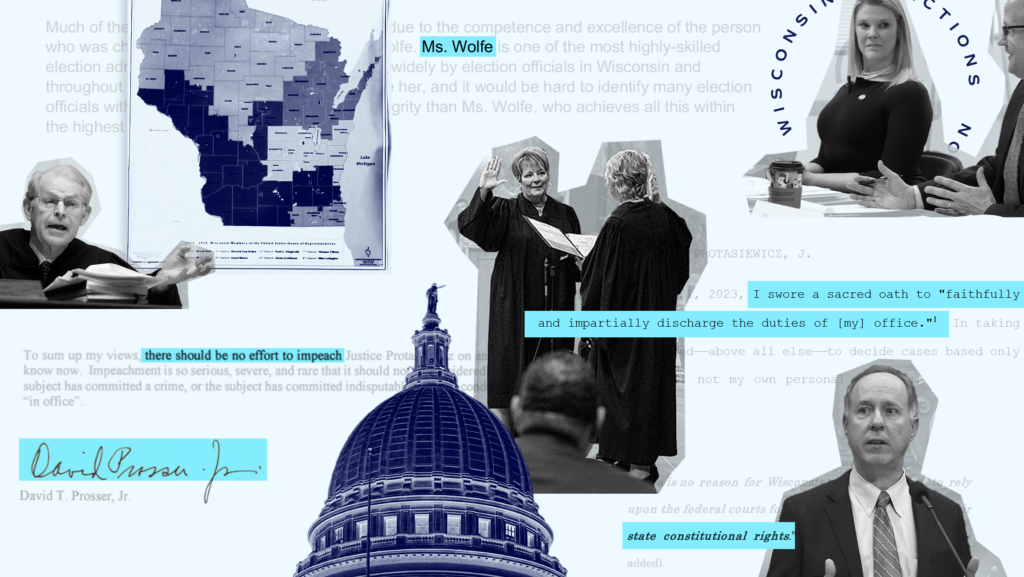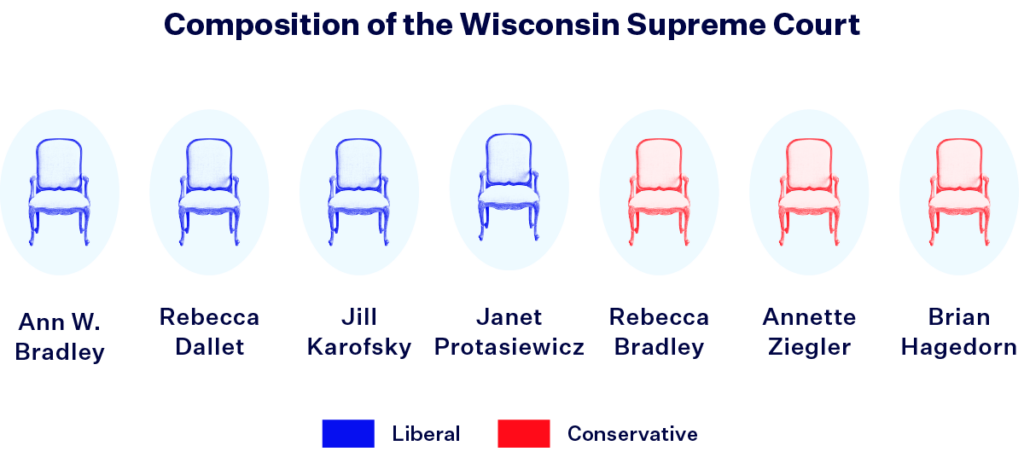Wisconsin’s Legislative Maps Are Before the State Supreme Court

This morning, the Wisconsin Supreme Court is holding oral argument in a lawsuit challenging Wisconsin’s Assembly and Senate maps.
The petitioners — a group of Wisconsin voters — argue that the legislative districts are extreme partisan gerrymanders in violation of multiple provisions of the state constitution, including its guarantee of equal protection, free speech and freedom of association. The voters contend that the maps also “blatantly and intolerably” fail “even the basic constitutional requirement of contiguity,” which requires districts to be as compact as “practicable” and bound by municipality lines.
Additionally, the voters contend that the legislative districts violate the state constitution’s separation of powers rule since the districts — which were ultimately imposed by the then-conservative majority on the Wisconsin Supreme Court in April 2022 — are the very same maps that the governor vetoed and the Legislature failed to override.
Finally, the lawsuit alleges that Wisconsin’s guarantee of “a free government” is violated as it requires “the government to adhere to moderation, temperance, and justice.” Filed directly to the Wisconsin Supreme Court, this lawsuit is asking the court to block the current legislative maps and order new, fairer maps for future elections. It is also seeking special elections for state senators elected under the allegedly unconstitutional maps.
The path to today’s oral argument begins with map plans labeled as “assertive” and “aggressive” in 2011.
The complaint, which was filed in August 2023, outlines that the maps in place are based on the Republican legislators’ 2011 plans that were subjected to “substantial statistical testing” in order to ensure a Republican majority regardless of the party’s vote share in an election. The drafts of the maps that were ultimately adopted were labeled by the map drawers as “assertive” and “aggressive” and explicitly manipulated to entrench a Republican advantage.
The effect was successful. In 2012, during the first elections with the gerrymandered maps in place, Republicans won 48.6% of the statewide vote but secured 60 of the 99 Assembly seats. When Democrats later won a similar vote share, they won only 36 Assembly seats — a remarkable 24-seat disparity. In 2018, Republicans won 63 seats with only 44.8% of the vote.
The petitioners allege that the “extreme partisan” gerrymandering of the state Assembly districts was compounded by “the careful grouping of assembly districts to form senate districts” to create a “double gerrymander.”
Following the release of 2020 census data, Republican lawmakers passed legislation that “increased the partisan skew,” to further defend the manufactured Republican majority. Gov. Tony Evers (D), who was soundly reelected last fall, vetoed the bill’s proposed Assembly and Senate maps in November 2021.
Simultaneously, the existing 2011-drawn legislative districts were challenged in both state and federal court. On Nov. 17, 2021, in the state-level lawsuit, the Wisconsin Supreme Court asked the parties involved — Evers included — to submit new legislative maps. The state’s highest court adopted Evers’ plan of “least changes,” but increased the number of majority-Black Assembly districts from six to seven.
In March 2022, the Republican-controlled Legislature appealed the ruling to the U.S. Supreme Court and the Court soon after issued an unsigned seven-page decision that reversed the Wisconsin Supreme Court decision that adopted Evers’ map and sent the lawsuit back to state court.
Justices Sonia Sotomayor and Elena Kagan dissented, calling the Court’s ruling “unprecedented” as it “summarily overturn[ed] a Wisconsin Supreme Court decision resolving a conflict over the State’s redistricting, a decision rendered after a 5-month process involving all interested stakeholders.”
After the lawsuit was returned to state court, the Wisconsin Supreme Court heard oral argument on Jan. 19, 2022. Just six months after Gov. Evers originally vetoed the maps, the state’s highest court adopted the Republican Legislature-drawn maps on the basis of race neutrality. This April 2022 ruling resulted in Republicans securing a near two-thirds majority in both chambers, despite an “equally divided electorate,” in the 2022 elections. All 99 Assembly seats were up for election as were 17 of the 33 seats in the state Senate.
The current lawsuit argues that the state Supreme Court’s decision — and by extension the maps that were allowed to follow — violates the Wisconsin Constitution’s separation of powers principle and Evers’ constitutional authority to veto bills in two separate ways.
One, “the [state Supreme] Court usurped the exclusive gubernatorial power to approve (or reject) a law passed by the Legislature” and, two, “the [state Supreme] Court exercised the exclusive legislative power to override the Governor’s veto.” This alleged violation is one of the primary matters that will be addressed in today’s oral argument.

As a part of their request for new fair maps, the petitioners argue that the least change remedial approach is “not binding precedent” and thus should not apply to this case — meaning they are asking for the Republicans’ legislative entrenchment to be dismantled entirely.
Critically, the petitioners are also seeking special elections in November 2024 for state senators whose terms would not otherwise expire until 2027, arguing that “[b]ecause they were elected from unconstitutionally configured districts, they lack legal entitlement to their office.” If this request is granted, all 132 state legislators would be up for election next year with those elected in the special election serving out two-year terms.
On Oct. 6, the Wisconsin Supreme Court agreed to hear the case.
Beyond the alleged constitutional violations, the usurpation of power and the double gerrymanders, the venue of the lawsuit is not without controversy.
On Aug. 1, the Wisconsin Supreme Court’s majority flipped to a long-awaited, hard-fought liberal majority with the start of Justice Janet Protasiewicz’s ten-year term. It’s the first time in 15 years that conservatives have not held a majority on the battleground state’s highest court.
In April of this year, Protasiewicz defeated the conservative twice-failed Wisconsin Supreme Court hopeful Judge Dan Kelly within an hour of polls closing and by an 11-point margin. For context, Evers’ reelection by a three-point margin in November 2022 was lauded as a landslide.
The filing of the lawsuit directly to the Wisconsin Supreme Court, just one day into the new liberal majority, received backlash instantly. Republican Senate Majority Leader Devin LeMahieu — and one of the respondents of the suit — accused the petitioners of “coming to collect,” in reference to a statement Protasiewicz made on the campaign trail in which she called the Republican-drawn maps “rigged” and said she would welcome a review of them.
Since her election in April, the state’s Republicans have been threatening to impeach the newly elected justice if she did not recuse herself from any redistricting lawsuits challenging Wisconsin’s legislative maps.
Republicans argued this statement constituted a predetermination of how the justice would rule on a case challenging the maps. In September, a state judiciary disciplinary panel rejected multiple complaints filed by Republicans alleging that the statements violated ethics rules.
Not one to be deterred by the rule of law, Speaker of the Assembly Robin Vos (R) convened a secret panel of three conservative former Wisconsin Supreme Court justices to review the possibility of impeaching Protasiewicz in September — ahead of the court agreeing to hear the redistricting challenge. A legal filing in a lawsuit challenging the secret nature of the panel revealed that Justice David Prosser was joined by former Justices Jon Wilcox and Patience Roggensack, the now-retired Supreme Court justice whom Protasiewicz succeeded after winning in April.
As the state Supreme Court was poised to announce whether it would hear the case or not, Prosser advised Vos that there should be “no effort to impeach” Protasiewicz over her refusal to recuse herself from the ongoing legal challenge to the state’s legislative maps.
In agreeing to hear the case, Protasiewicz also denied the Wisconsin Legislature’s motion for recusal. In the Oct. 6 order, the newly elected justice argued, “Recusal decisions are controlled by the law. They are not a matter of personal preference… As Justice Prosser has warned, unjustified recusal can affect the integrity of the judicial branch.”
A week later, Vos and fellow Republicans indicated that they would heed Prosser’s guidance and walked back their baseless impeachment crusade. As Prosser referenced, impeachment is permitted under Wisconsin statute only for corrupt conduct in office or for the commission of a crime.
All eyes are on Wisconsin’s legislative maps and this lawsuit as the state’s Republicans have scrambled to maintain their manufactured majority any way they can ahead of 2024 — including misguided efforts to oust the state’s top election official, Meagan Wolfe.